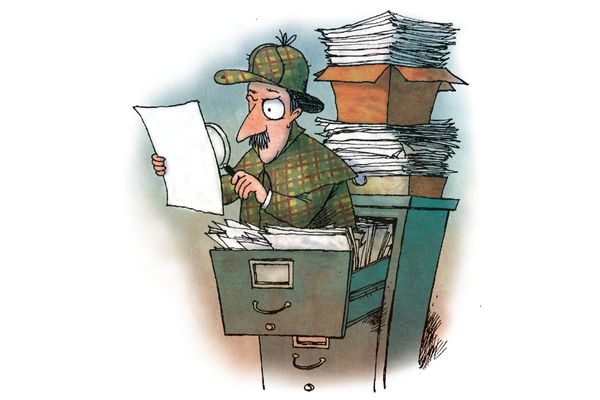A Confidentiality Pledge
June 01, 2018
Ethical Educator

Scenario:
A recently retired superintendent now works on education research at the nearby state university. He is reviewing papers submitted by former graduate students, all of them now employed by his former district as teachers and professional staff.
He has promised them confidentiality in using their work. He discovers one paper has been plagiarized.
Should the retired superintendent report his discovery to the graduate studies chair without revealing the student’s name to keep his promise?
Sarah Jerome:
When students enter the university, they are expected to pledge they will not cheat or plagiarize the work of others. Based on that pledge, the professor has a responsibility to report plagiarism to the chair and to name the student involved. It does not matter what the professor’s past role was nor does it matter the plagiarizer is employed by the professor’s previous school district nor does it matter that the professor promised confidentiality.
The essential issue is the errant student stealing someone else’s ideas without giving proper credit or recognition to the creator of those ideas. That student has broken his pledge to the university. The professor has an obligation to the university to reveal his discovery.
Shelley Berman:
Plagiarism is a fundamental violation of academic integrity. All educators, no matter their position, serve as role models for their students and are held to a high standard of academic integrity. When an educator plagiarizes another’s work, the consequences can be severe, sometimes even costing the individual his or her job.
Universities also have severe punishments for plagiarism that can extend from disciplinary probation and a failing grade in a course to expulsion from the university. An incident of plagiarism is sometimes noted on a student’s permanent transcript and has lifelong impact on that individual’s future opportunities.
The retired superintendent’s pledge of confidentiality pertained to the use of the individual’s work, not to remaining silent in the face of a violation of academic ethics. The superintendent needs to review the university’s official policy on plagiarism and determine how best to proceed. As part of this process, he needs to relay his concern to the individual and follow the university’s prescribed reporting procedures. As a graduate student and an educator, the individual who plagiarized should have known his or her responsibility to meet the ethical standards and integrity of his or her role and the seriousness with which this violation would be treated.
Meira Levinson:
Telling the graduate studies chair, “I have discovered that one of your former students once plagiarized a paper,” tells the chair nothing she does not already know and provides no actionable intelligence either now or for the future. The superintendent should therefore not report anything to her.
As much as professors would like to believe that all students demonstrate total academic integrity, we know there are lapses. (This is why the retired superintendent’s report would tell the chair nothing new.)
When plagiarism is identified while the student is still enrolled in the course or degree, then the established protocols ought to be followed to determine the severity of the violation, any mitigating considerations and appropriate responses (ranging from requiring the student to rewrite the paper and receive tutoring in academic research and writing to assigning a failing course grade or expelling the student). But unless the student has plagiarized a masters or doctoral thesis, universities have little recourse when plagiarism is identified post-graduation.
I’m interested in the fact that the questioner does not ask whether the retired superintendent should inform his old school district that they are employing a teacher who committed plagiarism. I assume it is because the promise of confidentiality trumps other considerations. This seems right, especially insofar as the superintendent is now in fact operating in the role of educational researcher. Research ethics require that promises of confidentiality be taken very seriously indeed. But in some ways, it is a more interesting and troubling problem, especially if the plagiarism is serious enough to cast doubt on the teacher’s own academic integrity and capacity to teach.
Maggie Lopez:
The superintendent needs to talk to the former graduate student about the plagiarized paper and let him know he will need to inform the graduate studies chair. The superintendent also needs to consider whether he has a responsibility to inform his past district. The former graduate student is a role model for students and therefore has a responsibility regarding his ethical behavior and code of conduct.
Additionally, if the superintendent is using these former graduate students’ papers as a reference for his research, he needs to be giving them credit for their contribution to his research work. It is unclear why he would need to promise confidentiality
in the first place as researchers are expected to cite their sources for research work.
The Ethical Educator panel consists of
- Shelley Berman, superintendent, Andover, Mass.;
- Sarah Jerome, a retired superintendent in Arlington Heights, Ill., and an AASA past president;
- Meira Levinson, professor of education, Harvard University, and author of Dilemmas of Educational Ethics: Cases and Commentaries; and
- Maggie Lopez, interim superintendent, Eagle County, Colo.
Each month, School Administrator draws on actual circumstances to raise an ethical decision-making dilemma in K-12 education. Our distinguished panelists provide their own resolutions to each dilemma.
Do you have a suggestion for a dilemma to
be considered?
Send it to: magazine@aasa.org
Advertisement
Advertisement
Advertisement
Advertisement

.png?sfvrsn=53cf74f6_7)

